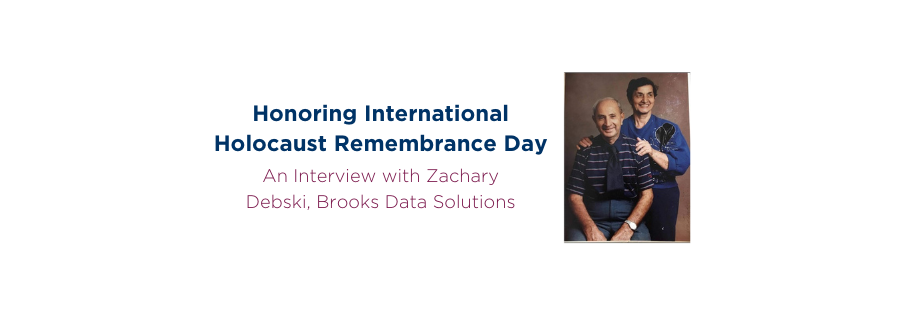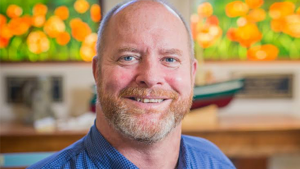Honoring International Holocaust Remembrance Day 2021: An Interview with Zachary Debski

Back to physical health resource hub
Remembering the Holocaust
January 27 is Holocaust Remembrance Day. How does each new generation learn and connect to events that – while among the worst imaginable – occurred more than 75 years ago? We talked with Brooks’ Zachary Debski, whose surprising direct connection to the Holocaust gave him a deeper understanding and increased meaning.
What is International Holocaust Remembrance Day (IHRD)?
As the United States Holocaust Memorial Museum tells us, “The United Nations General Assembly designated January 27 – the anniversary of the liberation of Auschwitz-Birkenau – as International Holocaust Remembrance Day. On this annual day of commemoration, the UN urges every member state to honor the six million Jewish victims of the Holocaust and millions of other victims of Nazism…”
The 2005 United Nations resolution establishing IHRD goes on to reject any form of Holocaust denial, supports programs to remember the Holocaust and help prevent further genocide, and condemns all forms of “religious intolerance, incitement, harassment or violence against persons or communities based on ethnic origin or religious belief” throughout the world.
Brooks’ Zachary Debski – Grandson of a Holocaust Survivor
Zachary Debski has been with Brooks for more than three years, and currently works as a SAS developer for the Brooks Center for Data Solutions. He works with the database team and statisticians to retrieve and curate data for analysis.
Zachary, who is 24, never met his paternal grandfather, Morris Debski, who died in 1991 at the age of 67. What Zachary learned, though, was that Morris Debski survived three Nazi concentration camps and was liberated by the Soviets as the war was ending.
“I believe I was in 9th grade, around 15 years old, and we were learning about WWII in school,” said Zachary. “But, you know, you’re learning it from a textbook, it’s a very high-level overview. You learn about Pearl Harbor, you learn about why we entered the war, you learn about our role in the war, fighting against the Germans, invading Normandy and dropping atomic bombs on Japan. You learn about the Holocaust, but you never really fully understand what was going on in Europe. You study it for just a few days, take a test and move on.”
“So, I was at home talking about WWII, and my mom said, ‘Did you know your grandpa was in the Holocaust?’ I said I had no idea. I asked if he had fought in the war. ‘No,’ my mom said. ‘He was born in Poland and he survived the Holocaust.’ Then my dad said, ‘Well, let me show you the video.’”
“Oral history interview with Morris Debski”
In August 1986 Morris Debski sat down and told his story to an interviewer for the Holocaust Documentation and Education Center (HDEC) of Dania Beach, Florida. HDEC was created in 1980 with the mission of being “A Living Memorial through Education” through the collecting and archiving of Holocaust eyewitness oral history testimonies. To date, HEDC has been part of collecting more than 2,500 oral histories of survivors, liberators and rescuers – one of the largest collections in the world. Morris Debski’s interview is on two VHS tapes – it has yet to be permanently digitized in the collection and can only be viewed on site at the HDEC. A copy is in the permanent collection at the United States Holocaust Memorial Museum.
An Amazing Story
Any brief summary of Morris Debski’s experiences would never do them justice, but it’s important to try in any event. Debski was born in 1924 into a large family in the Polish city of Wodzislaw. In the 1930s they heard about the rise of Hitler and the Nazis. When the Germans arrived in 1940 the Jewish families were forced into a ghetto. Then came the “final solution” – and the Jews of Wodzislaw were packed into train cars, headed to the Treblinka extermination camp. At some point in the journey, Debski’s father threw Morris and a younger brother off the train – and the boys ran for their lives as guards fired at them.
Debski lost his brother in the mayhem – and never saw him again. Although he escaped going to Treblinka, the teenager ended up in a forced labor camp, making ammunition. In 1942 he was then sent to Skarzysko, another horrific labor camp where he again made ammunition in forced labor. Sources tell us that between 25,000 to 30,000 Jews were brought to Skarzysko, and between 18,000 to 23,000 died there.
In 1943 Debski found himself shipped to Czestochowa, where he continued to survive. With Soviet troops advancing on German positions in late 1944, the Czestochowa command tried moving as many thousands of prisoners as they could to other camps. Debski was one of only 5,200 who remained and were liberated by the Russians on January 17, 1945.
After more than two years in displaced persons camps in Poland, Germany and Cyprus, in 1948 Debski made a daring trek to Israel, where he joined the army and helped establish the Jewish state. Years later he emigrated to the US – South Florida – with his family, including his young son, Zachary’s father.
Keeping the Story Alive
Zachary watched the video two different times as a teenager, and once again as an adult – about a year ago. Zachary explains how, after this most recent viewing, he began researching his grandfather’s life and experiences, based on the interview. “I was trying to get more of an understanding of the towns, locations and his family. I thought, ‘Are there any other survivors?’ Because, as far as he knew, no one else in his family survived. I began wondering whether I had any relatives and things like that. That’s when the importance of it all really hit me.”
If he were to have kids, how would Zachary tell them about their great-grandfather? “I don’t know,” said Zachary, hesitant at first. “I would probably mention it to them when they were younger, just so they know what it is, but I wouldn’t go into detail until they were a little older and they can grasp the importance of the situation. I know it’s important and I know I would have to do it. In the interview my grandfather was really open about the things that happened. One of the last things he said in the interview was, ‘I want to tell people the truth and I don’t want this to happen again…’”


